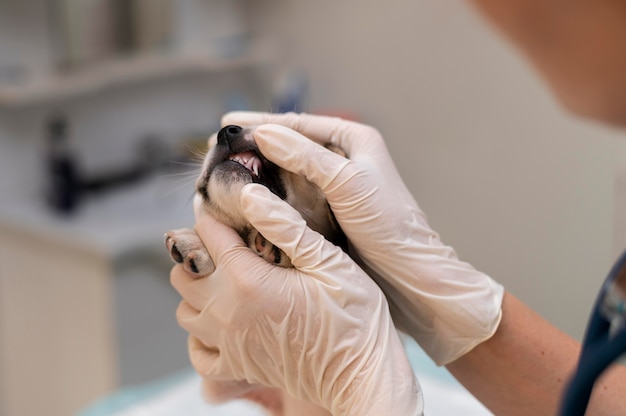Cold Weather Pet Wellness: Keep Your Pet Healthy in Highland Park

Cold Weather Pet Wellness: Keep Your Pet Healthy in Highland Park
As the crisp winds settle in and temperatures dip across Highland Park, pet owners begin to wonder how best to protect their pets from the challenges of cold weather. November brings more than just shorter days and chilly mornings; it also signals the start of a season when pets need extra attention to stay healthy and comfortable. At Pets4Life, located at 661 Central Avenue, Highland Park, IL 60035, we know that your pet’s wellbeing is a top priority. Our veterinary team is here to help you understand how a proactive pet wellness exam can be your greatest tool for maintaining your companion’s health throughout the winter months.
In this blog, we’ll explore what makes cold weather pet health so important in our region, the key signs to watch for that may indicate your pet needs extra care, and how scheduling a comprehensive pet exam can prevent seasonal issues before they become serious. We’ll also offer practical tips for at-home care and discuss when it’s time to seek professional veterinary support. Whether you’re searching for a vet near me or looking to ensure your pet is ready for the cold, our team is dedicated to supporting pets in Highland Park and surrounding communities with compassionate, thorough care. If you’re looking to book a wellness examination as the seasons change, you can learn more about our approach to preventive health on our wellness exam page.
Recognizing Cold Weather Health Concerns in Pets
As the temperatures drop in Highland Park, it’s important for pet owners to recognize the ways in which chilly weather can affect their furry friends. Cold weather pet health is about more than just keeping your pet warm; it encompasses everything from joint health and skin condition to immune system strength and energy levels. Some pets are more sensitive to the cold than others, especially puppies, senior pets, and those with certain health conditions.
Common signs that your pet might be struggling with the seasonal shift include changes in energy levels, such as unusual lethargy or reluctance to go outside. You may also notice shivering, curling up tightly in bed, or seeking out warmer spots in the house. Dry, flaky skin and a dull coat can be indicators that the cold, dry air is taking a toll. For dogs and cats with arthritis, colder weather often leads to increased stiffness or discomfort, making it harder for them to get up or move around comfortably. Additionally, pets may develop issues with cracked paw pads or excessive licking of their feet due to salt and ice on sidewalks.
By being attentive to these symptoms, you can catch early warning signs that your pet may need a little extra help this season. If you notice any of these changes, scheduling a pet wellness exam in Highland Park is a proactive way to address concerns before they progress.
Why Cold Weather Causes Health Challenges for Pets
Understanding the reasons behind cold weather pet health issues can help you take better care of your companion during the winter months. Like humans, pets are affected by environmental changes. When the temperature drops, the body works harder to maintain warmth; this can be especially taxing for small breeds, short-haired pets, or animals with chronic medical conditions.
Cold air can exacerbate joint stiffness, particularly in older dogs and cats who may already have underlying arthritis or hip dysplasia. The dry indoor heat that keeps us cozy can also dry out your pet’s skin, leading to itching and discomfort. Outdoor walks can present additional hazards, such as exposure to ice-melting chemicals, salt, and rough surfaces that can damage paw pads.
For pets with heart or respiratory conditions, the colder air may make breathing more difficult or even trigger coughing episodes. Immune systems can also be more vulnerable during the winter, increasing the risk of infections or seasonal illnesses. These factors highlight why regular checkups and preventive care are especially important as winter approaches. Scheduling a comprehensive pet exam in Highland Park or a surrounding area gives your veterinarian the opportunity to identify risk factors and develop a personalized plan to support your pet’s cold weather health.
Professional Treatment and Management: The Role of a Pet Wellness Exam in Highland Park
A pet wellness exam in Highland Park is one of the most effective ways to ensure your pet remains healthy and comfortable throughout the chilly season. During a wellness examination at Pets4Life, our veterinarians perform a thorough head-to-tail evaluation. This includes checking your pet’s skin and coat for dryness, inspecting joints for signs of discomfort, and listening to the heart and lungs for any changes that could indicate underlying health problems.
Our veterinary professionals may recommend diagnostic tests such as routine bloodwork, urinalysis, or on-site laboratory testing to catch hidden conditions early. For pets with a history of joint issues, we might discuss options for managing arthritis symptoms, such as supplements, prescription medications, or dietary adjustments.
Vaccination status is also reviewed during a wellness exam to ensure your pet is protected against seasonal illnesses that may become more prevalent in colder months. If you’re interested in learning more about how these preventive checkups work, our wellness examination page outlines the process and benefits in detail.
Beyond medical assessments, our veterinary team will discuss any changes you’ve noticed in your pet’s behavior, appetite, or activity level, helping to tailor advice specifically for your pet’s lifestyle and health status. Addressing these concerns during a comprehensive pet exam in Highland Park means you’re taking a proactive step toward supporting your pet’s long-term wellness.
Home Care and Prevention: Keeping Pets Comfortable in Highland Park’s Cold Weather
While professional veterinary care is crucial, there are many steps you can take at home to support cold weather pet health in Highland Park. Providing a warm, draft-free sleeping area is essential, especially for older pets who may have trouble regulating body temperature. Consider using pet-safe heated beds or additional blankets during the chilliest nights.
When it comes to outdoor time, monitor your pet closely. Shorten walks during extremely cold spells, and always wipe your pet’s paws after coming inside to remove salt or chemicals. Signs of discomfort, such as lifting paws or refusing to walk, indicate that your pet may need booties or protective wax. Regular grooming remains important in winter; a clean, well-brushed coat provides natural insulation, while trimming excessive fur between paw pads helps prevent ice accumulation.
Nutrition also plays a vital role in cold weather pet health. Some pets may require dietary adjustments to maintain a healthy weight and energy level through the winter; our veterinarians can provide guidance tailored to your pet’s needs during a wellness exam. Finally, keeping your pet hydrated is just as important during winter as it is in summer, even if your pet seems to drink less.
By combining these practical strategies with regular veterinary checkups, you create a solid foundation for your pet’s health as the seasons change.
When to Seek Veterinary Care: Protecting Your Pet’s Winter Wellness
Knowing when to reach out to your veterinarian is crucial during the colder months. If your pet begins to show persistent symptoms such as ongoing lethargy, shivering that does not improve indoors, limping, or severe skin irritation, it’s time to schedule an appointment. Additionally, sudden changes in appetite, coughing, breathing difficulties, or evidence of pain should always prompt a call to your local veterinary team.
Some conditions, like frostbite or hypothermia, require immediate attention. Warning signs for these emergencies include pale or blue-tinged skin, extreme weakness, or unconsciousness. In such cases, contact your veterinarian right away or head to the nearest animal emergency facility.
For most seasonal concerns, however, a pet wellness exam in Highland Park will allow your veterinary professionals to identify underlying problems and recommend appropriate interventions. Our team is always available to discuss any questions you have about your pet’s health during winter. If you’re searching for quality veterinary services near me, remember that regular checkups and open communication with your veterinarian are the best ways to safeguard your pet’s wellbeing.
Conclusion: Make Cold Weather Wellness a Priority with Pets4Life
As winter settles over Highland Park, protecting your pet’s health takes on special importance. From monitoring for early signs of discomfort to making small adjustments at home, your proactive care goes a long way toward ensuring your companion’s comfort and happiness. Scheduling a pet wellness exam in Highland Park is one of the most effective steps you can take to catch potential issues early and receive personalized advice tailored to your pet’s needs.
Our veterinary professionals at Pets4Life are committed to providing comprehensive, compassionate care all year round. We invite you to reach out to our team to discuss your concerns or to schedule your pet’s wellness examination. If you’re searching for a vet near me who truly understands the unique needs of pets in Highland Park, our clinic is ready to support you. Explore our full range of veterinary services or book your next wellness exam today.
For questions or to schedule an appointment, call us at (847) 434-2745 or visit our hospital at 661 Central Avenue, Highland Park, IL 60035. Let’s work together to keep your pet healthy, safe, and happy throughout the cold season and beyond.
This blog is intended for informational purposes only and does not replace professional veterinary advice. If you have concerns about your pet’s health, always consult with your veterinarian.






